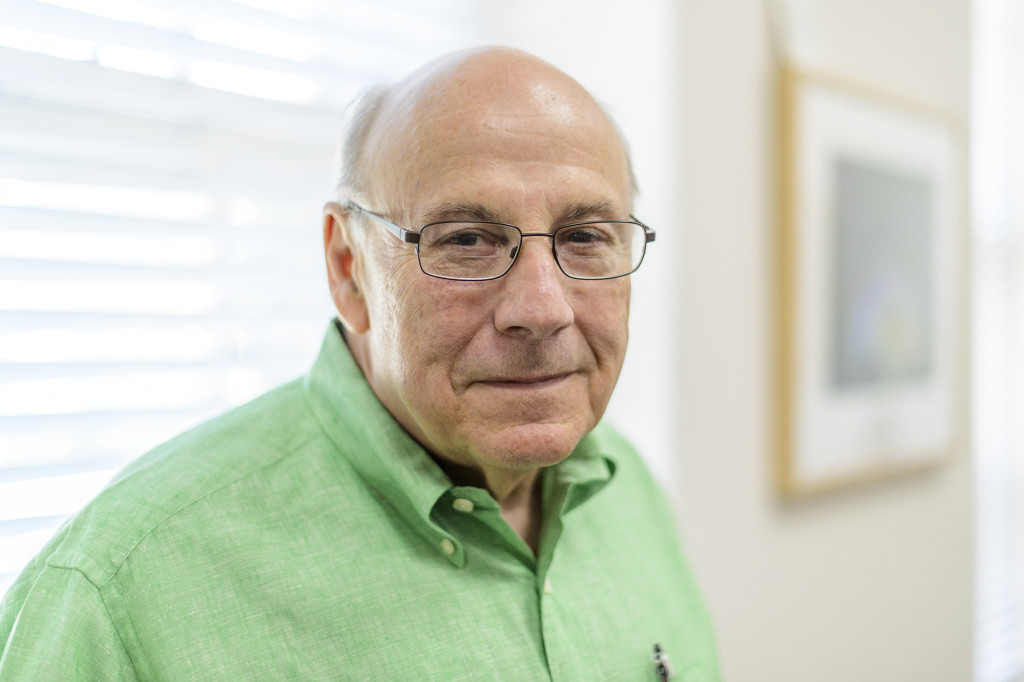Paul DeLuca, former provost and physicist, dies at 79

Paul Deluca pictured in 2014 during his tenure as provost of UW–Madson. As a faculty member and administrator, DeLuca championed the School of Medicine and Public Health and helped shape UW–Madison’s research enterprise. Photo: Bryce Richter
Paul M. DeLuca Jr., emeritus professor of medical physics and former provost of the University of Wisconsin–Madison, died on Oct. 30. He was 79.
DeLuca arrived at UW–Madison in 1971, and across more than four decades, he served as chair of the Department of Medical Physics as well as vice dean for research and graduate studies for the School of Medicine and Public Health. He served as provost and vice chancellor for academic affairs from 2009 until his retirement in 2014, working with chancellors Biddy Martin, David Ward and Rebecca Blank.
After completing his doctorate in nuclear physics at the University of Notre Dame, DeLuca worked at UW–Madison as a postdoctoral fellow and assistant scientist before he joined the faculty in 1975. Over the years, his role in the school and across campus continued to expand. He spent 10 years as departmental chair, followed by broader administrative roles.
DeLuca was born in 1944 in Troy, New York. The son of a neurosurgeon, he knew from a young age that he wanted to pursue a career in medicine but said he wanted to “come at it from another direction.” He focused on the connection between physics and medicine.
“Every time I did a physics experiment, it was a different experiment,” he said. “No one could predict the results. Everything was a surprise, and I really enjoyed that.”
As an administrator and champion of the school and UW–Madison’s research enterprise, DeLuca helped shape the university’s future. He helped greatly expand the research, training programs and facilities of the Department of Medical Physics during his time as chair. As vice dean for the School of Medicine and Public Health he was instrumental in the development of the Wisconsin Institutes for Medical Research and other research initiatives.
“Paul was a spectacular leader, colleague and friend. He served as the school’s vice dean for research and graduate education with incredible wisdom, effectiveness, warmth and great humor,” says Robert N. Golden, dean of the school. “I was delighted when he became provost and deeply valued the opportunity to work with him in advancing the vision and missions of our university.”
As provost, DeLuca guided major leadership changes at the university, playing a lead role in the recruitment and hiring of 10 new deans and directors for various schools, colleges and institutes. He helped develop programs to advance the quality of undergraduate education, launch innovative massive open online courses and initiate and advance Discovery to Product, or D2P, a major partnership between UW–Madison and the Wisconsin Alumni Research Foundation that focuses on entrepreneurship and technology transfer.
“With his wide-ranging interests, he clearly enjoyed the role of provost, where he had the opportunity to work with the entire campus,” says Eden Inoway-Ronnie, chief of staff to the provost and who worked with DeLuca while he served in that role. “He was passionate about many things, and I know he cared deeply about the education and research opportunities we provide here at UW–Madison.”
As a researcher, DeLuca focused throughout his career on the connection between physics and medicine. He is known for his studies on the effects of high-energy particle radiation on humans. He authored and co-authored more than 75 research papers, many focusing on the various applications of physics to the diagnosis and treatment of cancer. As a teacher, he supervised nearly 50 graduate students and postdoctoral fellows.
He received the William D. Coolidge award from the American Association of Physicists in Medicine in 2016 and the UW Medical School Folkert O. Belzer Lifetime Achievement Award in 2005. He was a Fellow of AAPM and in 2007 was named UW–Madison Rennebohm Research Professor.
Prior to retiring from the university in 2014, DeLuca reflected on his work bringing physicians and scientists together.
“Well, I think that [my work] brought the medical school constituents into a true intellectual pair,” he said. “In other words, it was not a few scientists hanging around a bunch of clinicians seeing patients. It became a team of physicians and scientists working together to advance health care. And I think I had a fair bit to do with that.”
A memorial service will be held Saturday, Nov. 4 in Pennsylvania. A Madison service will be held at a later date, to be determined.
The DeLuca family asks that in lieu of flowers, donations be made to the Paul DeLuca, PhD, Scholar Fund, endowed in 2020 by several of DeLuca’s former medical physics students. Donations to the fund directly benefit students and extend a legacy that will support medical physics for years to come.
Tags: leadership, obituaries, provost
